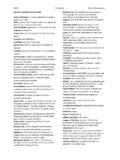Transcription of The Global Liveability Report 2017 A free overview …
1 A Report by The Economist Intelligence Unit The Global Liveability Report 2017 A free overviewThe world leader in Global business intelligenceThe Economist Intelligence Unit (The EIU) is the research and analysis division of The Economist Group, the sister company to The Economist newspaper. Created in 1946, we have over 70 years experience in helping businesses, financial firms and governments to understand how the world is changing and how that creates opportunities to be seized and risks to be managed. Given that many of the issues facing the world have an international (if not Global ) dimension, The EIU is ideally positioned to be commentator, interpreter and forecaster on the phenomenon of globalisation as it gathers pace and subscription servicesThe world s leading organisations rely on our subscription services for data, analysis and forecasts to keep them informed about what is happening around the world.
2 We specialise in: Country Analysis: Access to regular, detailed country-specific economic and political forecasts, as well as assessments of the business and regulatory environments in different markets. Risk Analysis: Our risk services identify actual and potential threats around the world and help our clients understand the implications for their organisations. Industry Analysis: Five year forecasts, analysis of key themes and news analysis for six key industries in 60 major economies. These forecasts are based on the latest data and in-depth analysis of industry ConsultingEIU Consulting is a bespoke service designed to provide solutions specific to our customers needs. We specialise in these key sectors: Consumer: Providing data-driven solutions for consumer-facing industries, our management consulting firm, EIU Canback, helps clients to enter new markets and deliver greater success in current markets.
3 Find out more at: Healthcare: Together with our two specialised consultancies, Bazian and Clearstate, The EIU helps healthcare organisations build and maintain successful and sustainable businesses across the healthcare ecosystem. Find out more at: Public Policy: Trusted by the sector s most influential stakeholders, our Global public policy practice provides evidence-based research for policy-makers and stakeholders seeking clear and measurable outcomes. Find out more at: Economist Corporate NetworkThe Economist Corporate Network (ECN) is The Economist Group s advisory service for organisational leaders seeking to better understand the economic and business environments of Global markets. Delivering independent, thought-provoking content, ECN provides clients with the knowledge, insight, and interaction that support better-informed strategies and decisions.
4 The Network is part of The Economist Intelligence Unit and is led by experts with in-depth understanding of the geographies and markets they oversee. The Network s membership-based operations cover Asia-Pacific, the Middle East, and Africa. Through a distinctive blend of interactive conferences, specially designed events, C-suite discussions, member briefings, and high-calibre research, The Economist Corporate Network delivers a range of macro ( Global , regional, national, and territorial) as well as industry-focused analysis on prevailing conditions and forecast Global Liveability Report 2017A free overview The Economist Intelligence Unit Limited 20171 ContentsThe findings of the latest Liveability survey 2 Worldwide terrorism continues to shake up stability 2 Conflict in worst performers has been globally destabilising 5 The top and bottom ten cities 5 About The Economist Intelligence Unit s Liveability survey 7 How the rating works 7 The suggested Liveability scale 7 How the rating is calculated 8 The Global Liveability Report 2017A free overview The Economist Intelligence Unit Limited 20172 The findings of the latest Liveability surveyWorldwide terrorism continues to shake up stability For the
5 Seventh consecutive year, Melbourne in Australia is the most liveable urban centre of the 140 cities surveyed, closely followed by the Austrian capital, Vienna. In fact, only percentage points separate the top two cities, and just and percentage points separate Canada s Vancouver and Toronto (ranked 3rd and 4th, respectively), from Melbourne. Another Canadian city, Calgary, shares joint fifth place with Adelaide in Australia. Although the top five cities remain unchanged, the past few years have seen increasing instability across the world, causing volatility in the scores of many cities. In Europe, cities have been affected by the spreading perceived threat of terrorism in the region. At the same time, this year cities such as Reykjavik, the capital of Iceland, and the Dutch capital, Amsterdam, have benefited from an increasing cultural availability and falling crime rates, enabling them to register improvements in living conditions.
6 Over the past six months 35 of the 140 cities surveyed have experienced changes in their ranking position. This rises to 44 cities, or about one-third of the total number surveyed, when looking at changes over the past 12 months. Overall, the survey shows a higher incidence of positive index movements. In fact, of the 17 cities with an index movement since last year, 12 have seen an improvement in their score, reflecting positive developments in other categories, despite heightened threats of terrorism or unrest with which cities around the world continue to ongoing weakening of Global stability scores has been made uncomfortably apparent by a number of high-profile incidents that have shown no signs of slowing in recent years.
7 Violent acts of terrorism have been reported in many countries, including Australia, Bangladesh, Belgium, France, Pakistan, Sweden, Turkey, the UK and the US. While not a new phenomenon, the frequency and spread of terrorism have increased noticeably and become even more Europe has become a focal point for mounting concerns, and repeated attacks in France and UK have had a contagion effect, raising terror alerts and lowering stability scores in cities across the region. However, there are other factors that could prove to be destabilising. Unrest has grown in some countries, particularly over the migration crisis, and the British vote to leave the EU could pave the way for further uncertainty and political has also been compounded by unrest and, in more extreme cases, civil war in some countries.
8 Iraq, Libya, Syria and Turkey remain the subject of high-profile civil unrest and armed conflicts, while a number of other countries, such as Nigeria, continue to battle insurgent groups. Meanwhile, even a relatively stable country such as the US has seen mounting civil unrest linked to the Black Lives Matter movement and the policies proposed by the 45th US president, Donald this, the world has also seen increased diplomatic tensions between countries that are weighing on stability. Russia s posturing in eastern Europe and the Middle East has been well reported, Iran has seen diplomatic ties improve with some countries and deteriorate with others, and concerns over geopolitical stability are growing in Asia owing to potential flashpoints involving a number of The Global Liveability Report 2017A free overview The Economist Intelligence Unit Limited 20173countries, including China and North Korea.
9 It is therefore not surprising that declining stability scores have been felt around the world. On the flip side, however, cities moving up the ranking are located largely in countries that have enjoyed periods of relative stability after previously reported falls in Liveability . These include, for example, Kiev in Ukraine, Tripoli in Libya and Colombo in Sri Lanka. Unfortunately, the improvements have been marginal and have not seen Liveability recover from previous levels or resulted in large shifts up the ranking. Amsterdam, Reykjavik, Budapest, Singapore and Montevideo are among those that have seen both their ranks improve. In total, there are 12 cities with scores that have improved over the past 12 months, up from impact of declining stability is most apparent when a five-year view of the Global average scores is taken.
10 Overall, the Global average Liveability score has fallen by to over the past five years. Weakening stability has been a key factor in driving this decrease. The average Global stability score has fallen by 2% over the past five years, from in 2012 to five years, 95 of the 140 cities surveyed have seen some change in their overall Liveability scores. Of these cities, an overwhelming 66 have seen declines in Liveability , but there is a silver lining, as this number is actually down from 69 just six months ago. Two cities in particular, Damascus in Syria and Kiev, have seen significant declines of 16 and 21 percentage points respectively, illustrating that conflict is, unsurprisingly, the key factor in undermining wider Liveability .






